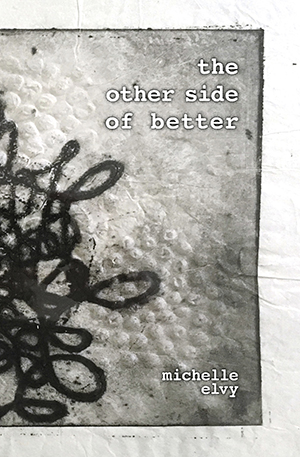the other side of better by Michelle Elvy is a fascinating hybrid of a book — part flash fiction collection, part flash fiction novella. The difference between the two forms is subtle, and like much with flash fiction, they can easily blur and overlap. Add in a dash of poetry and playing around with forms, what Elvy has produced is something which has multiple layers depending on how the book is approached.
The first section in particular features repeated characters and situations, looping around the subjects and examining them from every angle. Themes of family and strained relationships (I’m not sure any of the couples who show up in the book could be considered happy together), childhood friendships and traumas, travel and the search for home permeate the book.
Those themes are even looked at from an intertextual point of view, as the character of the Fuddy-Duddy Editor pops up throughout the first part of the book offering a critique of the story we have just read. The FDE even goes so far to critique the subtitle of Ideas for a long documentary film ‘after Lydia Davis with a nod to the German film Manner’. The FDE is scathing about the author’s desire to write like Lydia Davis ‘You think that will get you published?’
It’s a delightfully meta take on the process of writing and trying to get published, and probably gives any writer a bit of a sting.
The second section, The Fuddy-Duddy Editor Intrudes, comes immediately after that. It eases back on the meta, and in doing so loses something of what had made the FDE a welcome visitor in the first section of the book.
There are some great moments – where the FDE retells a story from the previous section, condensing seven pages into one, and possibly inviting comment on which version is better. The FDE admits she has never been a fan of Lydia Davis, followed straight away by a very Davis-eque dream story.
But the Intrusion also features more stories about childhood and falling out of love, which almost feels like a waste of the FDE’s charm. Did these stories really need to be given to the FDE? Or is it just a tactic to get them in when they’re so similar to what has come before?
In an example of how the layering of characters and stories produces something more complex than the sum of its parts, I even wondered if this was a commentary on the process of writing flash fiction. That while a writer might create eighty pocket worlds each with their own characters, there’s still only one author, and they will always end up writing like themselves.
As much as I love the writing in-jokes and layers of meta, The Fuddy-Duddy Editor Intrudes has a nudge-nudge wink-wink quality that does make me wonder if it’s written more for other writers than it is for general readers.
The other side of better is one of those books where even if you’re not enamoured of the subject matter, the language more than makes up for it. Elvy’s pieces have the hallmark of great flash fiction – that every word feels deliberate without any sense that the stories were written with a pen in one hand and a thesaurus in the other. Some pieces are undoubtedly poems. Some feel like they once might have been poems. Others are very much stories, and it is part of Elvy’s skill that they all fit together. Love, Story plays with both parts of the title – a doomed affair between a man who doesn’t read fiction and a narrator who doesn’t use commas: ‘I’m living with insufficient punctuation and trying to break up with a man who doesn’t believe in truth in fiction’.
Section three offers a change of pace and tone. There’s a speculative slant to the section which feels completely congruous with what has come before. Again, it is evidence of the skilled wordsmith that it all fits together so well.
Animals – both captive and wild – offer their own stories in various ways. Caged zoo apes give humans a straightforward middle finger. A giraffe also gets fingers, so she can use a typewriter to send a letter. There are self-congratulatory hippos, and a whale shark who is dreaming she is a boy (or is it the other way around?)
And amongst the animals, and the speculative stories about the end of the world, some of the characters from the first section appear again, giving the whole book a sense of coming to a gentle conclusion.
Elvy’s stories slide between forms and subjects with an assured manner that is born of long practice and even longer hours editing. A reader might be able to dip in and out of the collection, ignoring the prescribed order, and find something that makes them re-examine how they have been reading.
But Elvy has clearly put thought into the arrangement of the pieces, as characters from one story show up again five or fifty pages later — a tiny easter egg, in videogame terms, for those who read the whole thing in order. And by reading the whole thing in order they might get an idea of the repeated motifs which are examined, carefully and in different ways from every side. Which of these sides is the better one is left up to the reader.
This review was originally published on the Academy of NZ Literature site.



